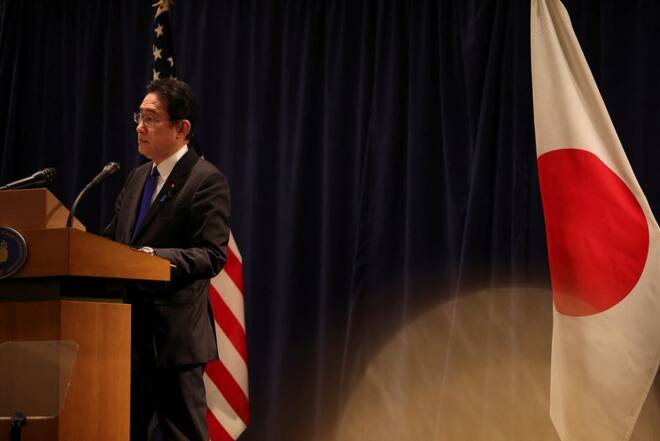Advertisement
Advertisement
Japan’s Kishida says he will nominate new BOJ head next month
By:
TOKYO (Reuters) - Japanese Prime Minister Fumio Kishida said on Sunday that he would take the April economic situation into account when choosing the next Bank of Japan (BOJ) governor, keeping markets guessing who may replace incumbent Haruhiko Kuroda.
By Tetsushi Kajimoto
TOKYO (Reuters) – Japanese Prime Minister Fumio Kishida said on Sunday he would nominate a new Bank of Japan governor next month, as markets test whether the central bank will change the ultra low-rate policy of the dovish Haruhiko Kuroda.
Kishida initially told a TV Tokyo programme that he would decide on Kuroda’s replacement by considering the economic situation for April, but when pressed he acknowledged this would likely be in February, “considering parliament’s schedule.”
He did not elaborate.
Kuroda, whose five-year term ends on April 8, has stuck with policies aimed at stoking price rises and growth, even with inflation at 41-year highs and double the BOJ’s target, and as central banks elsewhere have been raising interest rates.
The terms of Kuroda’s two deputies end on March 19. The three nominations must be approved by both houses of parliament.
The BOJ stuck to its ultra-easy policy on Wednesday, defying investors who have recently sought to break the bank’s cap on the 10-year government bond yield. But with even Kuroda sounding bullish about wage rises, expectations are growing that the BOJ will end its expansionist experiment this year.
Last week’s test followed the BOJ’s surprise December decision to double the target band for the yield to 0.5% above or below zero.
Former BOJ board member Sayuri Shirai, an advocate of reviewing the current stimulus who is considered a candidate for deputy governor, said on Sunday the BOJ should make its government bond buying more flexible but that low interest rates are warranted.
There is also speculation about changes to a policy accord between the central bank and the government, in which the BOJ pledges to achieve its 2% inflation target as early as possible.
Kishida said it was too early to comment on whether the accord needed to be altered but said there will be no change to the “basic stance” that his government and the BOJ work together “to achieve economic growth that involves structural wage hikes and reach the price-stability target stably and sustainably”.
(Reporting by Tetsushi Kajimoto; Editing by William Mallard)
About the Author
Reuterscontributor
Reuters, the news and media division of Thomson Reuters, is the world’s largest international multimedia news provider reaching more than one billion people every day. Reuters provides trusted business, financial, national, and international news to professionals via Thomson Reuters desktops, the world's media organizations, and directly to consumers at Reuters.com and via Reuters TV. Learn more about Thomson Reuters products:
Advertisement
